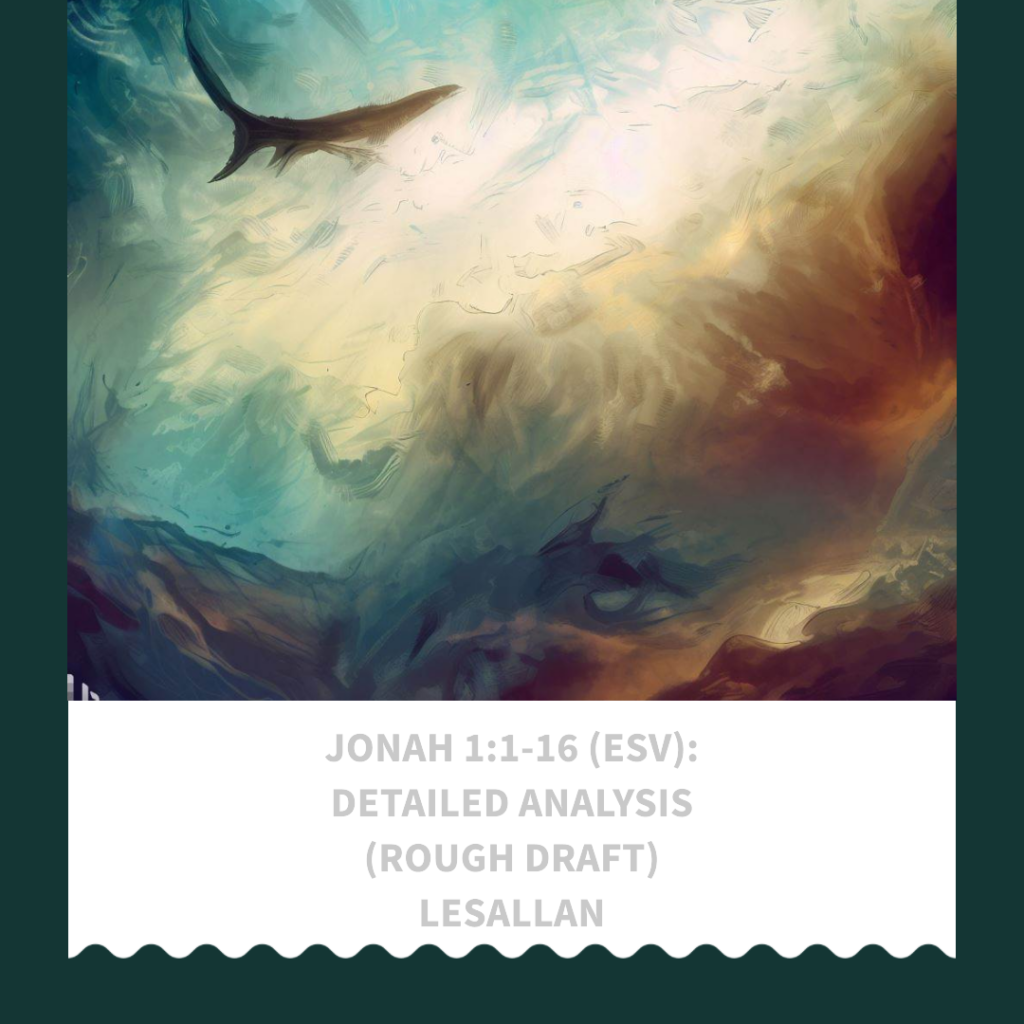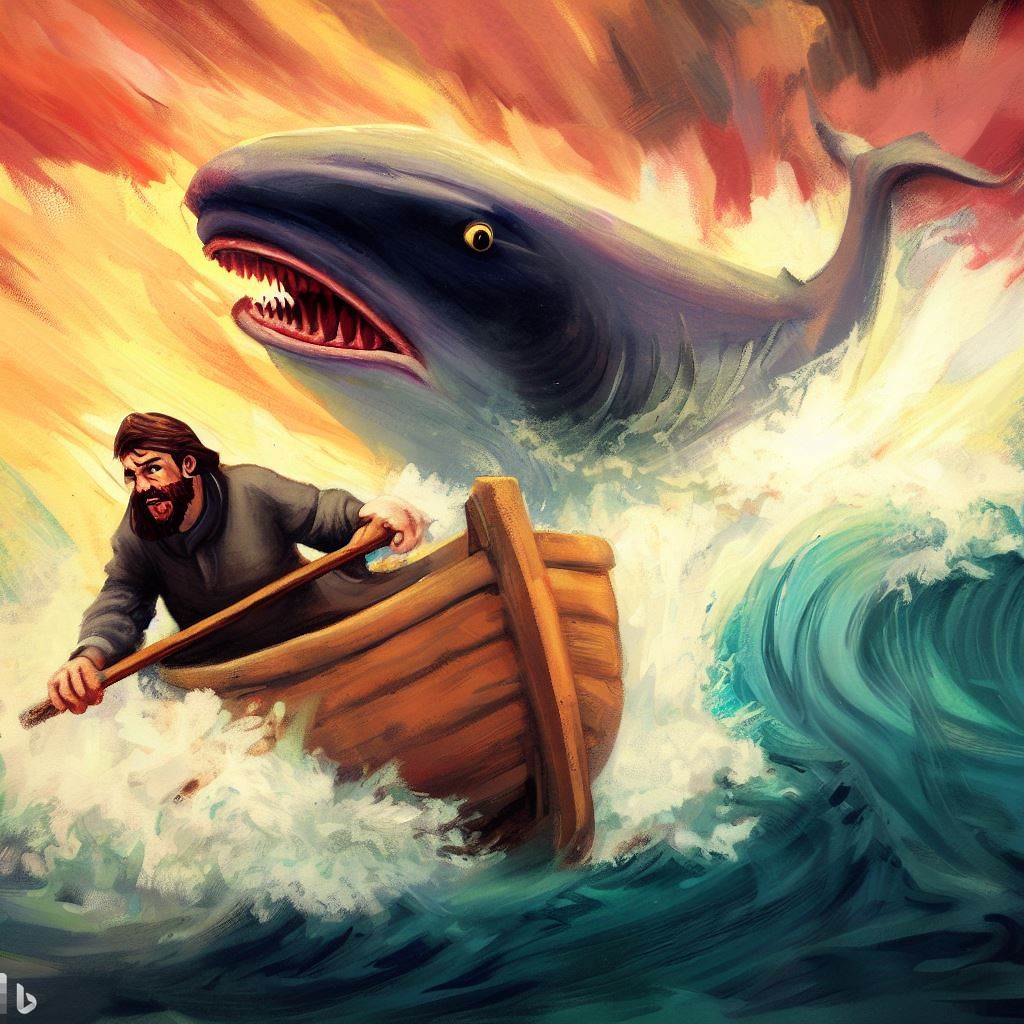Written By Lesallan August 6, 2023

Jonah 1:1-16 (ESV), which is the first chapter of the book of Jonah, tells how he tried to flee from God’s command to preach to Nineveh, but was caught in a storm and thrown into the sea by the sailors.
The passage begins with God’s word coming to Jonah, the son of Amittai, a prophet from Israel. God tells him to go to Nineveh, the capital of Assyria, and call out against it for its wickedness. Nineveh was a great and powerful city, but also an enemy of Israel and a symbol of evil and violence in the ancient world.
Jonah, however, does not want to obey God’s command. He fears that God might show mercy to Nineveh if they repent, and he does not want that to happen. He also does not want to face the danger and hostility of preaching to a foreign and pagan nation. So he decides to run away from God and his mission. He goes to Joppa, a port city on the Mediterranean coast, and finds a ship going to Tarshish, a distant place in the opposite direction of Nineveh.
Jonah thinks he can escape from God’s presence by going to Tarshish, but he is mistaken. God is sovereign over all creation, and he can see and reach Jonah wherever he goes. God sends a great wind on the sea, causing a violent storm that threatens to break up the ship. The sailors on board are terrified, and each one cries out to his own god for help. They also throw the cargo into the sea to lighten the ship.
Jonah, meanwhile, is asleep in the inner part of the ship. He is oblivious to the danger and the distress around him. He is also indifferent to the fate of the sailors and the people of Nineveh. The captain of the ship wakes him up and tells him to pray to his god, hoping that he might save them from the storm.
The sailors then cast lots to find out who is responsible for the calamity that has befallen them. The lot falls on Jonah, indicating that he is the guilty party. The sailors ask him who he is, where he comes from, what he does, and why he has brought this trouble upon them. Jonah confesses that he is a Hebrew who worships the Lord, the God of heaven, who made the sea and the dry land. He also admits that he is fleeing from God’s presence because he did not want to go to Nineveh.
The sailors are shocked and afraid when they hear this. They realize that Jonah has provoked the wrath of the Lord, who has power over nature and nations. They ask him what they should do to him to make the sea calm down. Jonah tells them to throw him into the sea, saying that it is his fault that the storm has come upon them. He knows that he deserves God’s judgment for his disobedience and rebellion.
The sailors are reluctant to do this, however. They try to row back to land, but they cannot overcome the force of the storm. They finally cry out to the Lord, asking him not to hold them accountable for Jonah’s life or for shedding innocent blood. They acknowledge that God has done as he pleased in sending the storm. They then lift up Jonah and hurl him into the sea.
As soon as Jonah is thrown into the water, the sea ceases from its raging. The storm subsides and peace is restored. The sailors are amazed and awed by this miracle. They fear the Lord greatly, and they offer a sacrifice and make vows to him.
The passage shows us several themes and lessons about God, Jonah, and ourselves:
God is gracious and compassionate. He cares about Nineveh, despite its sinfulness and hostility. He wants them to repent and be saved from destruction. He also cares about Jonah, despite his disobedience and indifference. He pursues him and disciplines him for his good.
God is sovereign and powerful. He controls all creation, including the wind, the sea, the storm, and even a fish (as we will see in chapter 2). He can use any means to accomplish his purposes and plans. He can also override human choices and actions when they go against his will.
Jonah is rebellious and selfish. He disobeys God’s command and runs away from his calling. He does not share God’s heart for Nineveh or for the sailors. He prefers his own comfort and security over God’s glory and mercy.
Jonah is foolish and ignorant. He thinks he can hide from God or escape from his presence. He does not realize that God sees everything and knows everything. He also does not understand that God’s ways are higher than his ways, and that God’s plans are better than his plans.
We are like Jonah in many ways. We often resist God’s will and avoid his mission. We often care more about ourselves than others. We often doubt God’s wisdom and goodness. We often forget God’s grace and power.
The passage challenges us to examine our hearts and lives, and to respond to God’s word and work in faith and obedience. It also invites us to marvel at God’s character and deeds, and to worship him with reverence and gratitude. I hope this summary and analysis has helped you understand the passage better.


